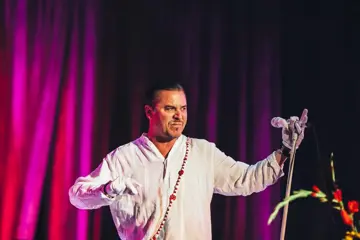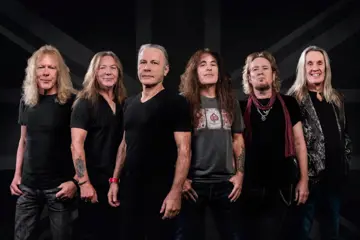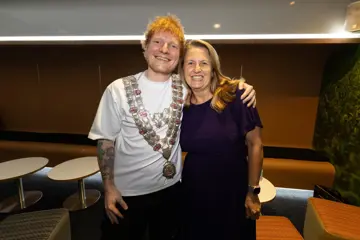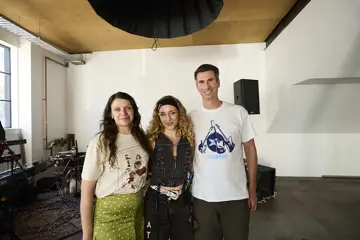Now releasing their second album, Die Young, Travis Cook and Marcus Whale make music together under the moniker Collarbones. I'm using the term 'together' loosely here. Hailing from different states, the boys create their music by sharing pieces over the interwebs. While obviously not your normal band set up, it's something that is intuitive.
“It's pretty instinctive for us to interact in that way,” Whale explains. “I think that's probably the truth for a lot of my generation, being that we spend so much time on the Internet. So many relationships form out of Internet interactions these days. So in truth it's really quite natural. For Travis and I, even though we see each other in person fairly often these days, it's still a lot easier to work on music when we're not in the same room. I think it helps that neither of us are very protective of the music that we're making and are willing to let one or the other of us finish off the tune.”
The new album Die Young is a follow up to their debut Iconography, which saw them nominated for a SMAC and an AIR award. It sees the duo embracing their personal pop-hero nostalgia as they head into the epoch of their 20s. “We were always thinking about celebrity and people that had been in a media memorial that we all have for dead celebrities,” Whale continues. “We all interact with them via watching them replayed over and over again. It ultimately fed into the art [on the album sleeve], where it's an iconographic representation of teenagers.
“It started out of the dead celebrities thing, primarily because the title track on the album was originally made out of a track that Travis made in his solo project, Cyst Impaled,” Whale explains. “That track, when he put it on Soundcloud, had a picture of River Phoenix; not necessarily that it had anything to do with him, aside from this sense of reminiscence about the song. When I heard it, I heard this whole song over the top of it, and it was all along the lines of this youth fragility thing. About the transience of these people, but still being made narrative by everyone that sees what they've been on film or in photographs. Which means that they're kind of embalmed in a way, by everyone seeing them. It also extended to me reminiscing, looking at old teen diaries. It's kind of embarrassing, but they were an inspiration for the extremity, naivety and stupidity of a lot of those feelings, which to me I think felt really profound at the time.”
Don't miss a beat with our FREE daily newsletter
River Phoenix also provided the inspiration behind French director Michael Salerno's visual interpretation of the album. Salerno travelled to Sweden to photograph and video River Phoenix lookalikes in a freezing forest. “He paid his own way to Sweden to do this!” Whale exclaims. “He said Parisian boys have a particular look that he wasn't looking for in this thing.”
While drawing from youth ideals and experiences, Die Young is not a light-hearted romp down memory lane, but rather a gritty deconstruction of the yearning and loss that feels so deep to those so young. It's about dying to be someone, dying for something and dying publically. Whale doesn't advise playing it at your funeral, though. “It's pretty bleak. I guess some people play music at funerals that is bleak. I just have no idea how that would work. What would be appropriate? You want people to cry and be completely destroyed by your funeral service. That's pretty easy, just put on some Sigor Ros and then everyone's in tears. But I don't know whether a funeral should be like that. Or at least my funeral.” Whale's funeral is more likely to have a boppier soundtrack. “Some fun '90s R&B, like Aaliyah, early Destiny's Child, No No No Part 1. A bit of TLC. They can be talking about completely horrific subjects and still sound optimistic and bubbly. Waterfalls is serious, but it feels really great to listen to.”
The new release marks a small but significant shift for the duo; turning their sampling styles towards reconstruction, rather than stringing pieces together, in an experience they had recently with Big Scary's track Bad Friends. “It was actually a really really nice experience, because Travis and I really enjoy remixing really straight-up songs,” Whale says. “The fabric is really malleable. Like, when someone's just playing an acoustic guitar and singing you can do anything, and if you keep the song intact it can keep its own identity. It's something I've only really come to respect and work with in the past year. I spent all my teen years being really pretentious and saying, 'There's nothing good about pop music, you guys are really mainstream and don't understand me'. The past year or two, all I listen to is pop music. I really like that song, and it was really nice to transform it into something more dense.”
When asked about the possibility of reverse engineering the process, where a Collarbones track is played straight-up on traditional instruments, Whale lights up. “I think for some of these songs on [Die Young] it might be possible. I do want to do that somehow. I've got a piano at home and I can play some of the songs. Some of them ended up being like that. I'd try and work out what to sing over the top of them by playing on piano to try and get a conception of what the song would be. The last album was not like that all. It was a whole lot of instrumental tracks and interludes and bits of things, kind of more about the references than the songs. Whereas this one's definitely the first big attempt I've ever had at doing straight-up songwriting.”
For a first attempt, it's pretty damn good. Whale seems to have a good grasp of structure and storytelling, evident on the new single Hypothermia, and his album favourite Missing. “We actually only finished it [Missing] a couple of weeks before it came out as a single. It wasn't originally part of the album. Originally there was a kind of ambient track in the middle there, and it felt a bit regressive to have a bit too much of that interlude-y stuff on an album which is more dependent on the songs. So we made [Missing] and it came about really organically, eventually.” While it's a little odd to hear an electronic, sample-based, Internet-connected musician talk about things happening organically, it's testament to the pair's talent that they try new things, embrace any and all styles of music and just muck around with things until they produce something complete.
Collarbones will be playing the following shows:
Friday 12 October - The Standard, Sydney NSW















